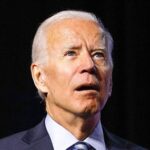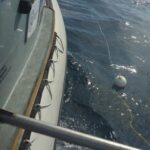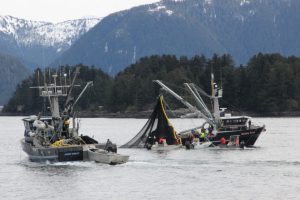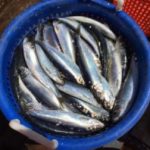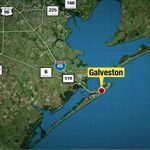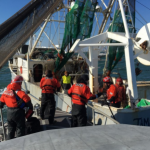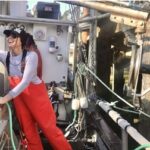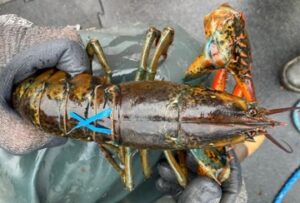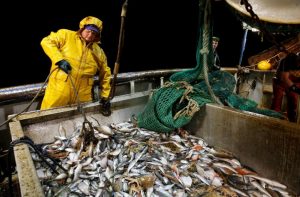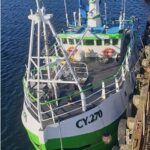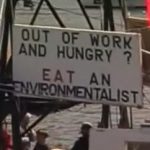Ryan Cleary, President of FISH-NL, gave the following statement this morning, Tuesday, Dec. 3rd, 2019:
Good morning to the media, and viewers on Facebook live.
Thank you for coming.
Thank you for tuning in.
My name is Ryan Cleary, President of FISH-NL.
I’m here with Peter Leonard, Vice-President of FISH-NL, and an inshore fisherman from Southern Harbour.
I’m also joined by Jason Sullivan, Secretary-Treasurer of FISH-NL and an inshore fisherman from Bay Bulls.
The remaining two members of the FISH-NL executive — Boyd Lavers of Port Saunders on the Great Northern Peninsula, Captain of the Over 40 Fleet, and Keith Boland who fishes out of St. John’s, Captain of the Under 40, couldn’t be here today.
In September, 2016, more than three years ago, we held a news conference in Petty Habour to announce we’d be taking on a David vs. Goliath challenge — breaking inshore harvesters free from the FFAW-Unifor.
Harvesters asked me to lead them, and I took on the challenge, because I believed then — as I know now — that the FFAW has lost its way.
That the FFAW has a labour monopoly over the fishing industry — fish plants, inshore fishermen workers on offshore factory-freezer trawlers, workers on fish farms.
In representing all sectors of the Newfoundland and Labrador fishery, the FFAW-Unifor represents no one group of workers as they should be represented.
A salt-water monopoly breeds suspicion and mistrust, and weakens the entire industry.
The FFAW is in a conflict of interest with the federal government, with oil and gas companies, and with its own members.
This isn’t opinion, this is fact, which FISH-NL has spent the past three-plus years digging up, and pointing out.
The salt-water monopoly and these conflicts of interest do not work in the best interests of inshore harvesters, or our rural communities, or the provincial economy.
I believe that to my core, as a Newfoundlander.
Newfoundland and Labrador harvesters are loosing access to the fish off our shores, loosing fish to foreign nations, to other provinces.
Fish stocks are in brutal shape. Young harvesters cannot get into the fishery. Fishing boats are tied up for most of the year with nothing to catch.
Just last week, DFO held a groundfish advisory meeting in St. John’s.
Scientists report overall biomass declines to groundfish stocks on the Grand Banks of up to 35 per cent since 2010.
The fishery is in perpetual crisis, problems are never solved — they’re raised, and ignored.
FISH-NL’s first application for certification was dismissed by the Labour Relations Board in September 2018. The board ruled we didn’t have enough support.
There were positives from that first application — we learned the rules of the game. We didn’t (we don’t) agree with those rules, but at least we knew what they are. We didn’t know the rules the first time.
And we learned the goal posts.
On Aug. 12th of this year FISH-NL began out second membership drive.
We decided to extend the drive past the usual 90-day timeline based on a past-precedent set in 1997 when the UFCW attempted the same thing we did — to break free inshore fishermen from the FFAW.
This province is huge, so is the bargaining unit, spread out over every nook and cranny.
In taking the extension, FISH-NL wanted to make sure that every inshore harvester had an opportunity to sign a card.
We know that not every harvester has had that opportunity.
But FISH-NL has called this news conference today to announce we’re ending our membership drive, and we won’t be filing an application for certification with the province’s Labour Relations Board.
FISH-NL has collected MORE cards than in 2016 when we presented 2,372 to the Labour Relations Board, but our total number of cards is still far fewer than the 4,000-mark set by the board to trigger the vote.
I’ve yet to meet an inshore harvester who believes there are 10,000 fishermen on the water today in Newfoundland and Labrador.
No one believes that, because there aren’t.
And so we don’t have 4,000 cards.
I believe Newfoundland and Labrador’s inshore fishery is in peril. That’s what’s driven me for the more than three years I’ve battled — and make no mistake, this has been a battle.
There wasn’t just one goliath to take on — there were others, the Labour Relations Board, the Dwight Ball government.
The definition of an inshore harvester that we worked with — the eligibility criteria to sign a card — was any one with a single fish sale in their name this year or in 2018.
Now, does that make you a legitimate fisherman?
It does in the eyes of the FFAW, and the labour Relations Board.
And that’s wrong. That’s the labour lie we’ve been working with.
The reality also is — and I’ve said this before — we can do this with inshore harvesters, we can’t do it for them.
Again, the executive of FISH-NL has decided to end our attempt at an application for certification, and the intention is to dissolve FISH-NL.
I have a message for the thousands of harvesters who signed FISH-NL cards, and a message to the 437 harvesters who paid dues to FISH-NL.
Keep fighting — against mismanagement.
Keep fighting — against conflicts of interest.
Keep fighting — against favouritism and unfair, undemocratic, union practices.
Keep fighting for what’s right — because there’s so much wrong in today’s fishery.
And everybody knows it.
Most importantly, keep trying to fight with each other — side by side.
The more individual fishermen and women worth together, the better things can be.
Right is right/wrong is wrong.
The status quo may be working for a few who are making a fortune, but it’s not working for the vast majority of harvesters who are not, for the dozens and dozens of fishing communities that are fading away.
I have a message to the government of Premier Dwight Ball: your administration is failing our inshore fishery because you’re not fighting for the inshore fishery.
Ottawa is mismanaging the Newfoundland and Labrador fisheries, it has for decades, but the status quo seems fine for the provincial government.
We have a renewable, billion-dollar industry with massive potential — an industry that impacts every community in this province — and the Dwight Ball government has turned its back on it.
In favour of an aquaculture model that the rest of the world is running away from.
We must demand better.
I also have a message for the labour movement — not just here in Newfoundland and Labrador — but across Canada.
You’re failing workers — you’re failing Newfoundland and Labrador’s inshore harvesters.
Who do you call to investigate when a union is in a conflict of interest, when a union has lost its way, when members can’t tell who’s the union and who’s the manager?
Who is there to police the union movement?
The answer is no one. There is no one to call. No one to investigate.
The Newfoundland and Labrador Federation of Labour is meeting this week in St. John’s.
They should hang their heads in shame over what’s happened here.
Thousands of inshore harvesters have signed cards because they know there’s a problem with the representation of the FFAW-Unifor.
Harvesters have no benefits outside of a small life-insurance. No pension, no right to strike, no choice, no free market.
The FFAW’s conflicts of interest with governments, with oil companies, with its own members, are fact, and there’s no one to call, nothing to be done about it.
The provincial labour movement, the national labour movement, have turned blind eyes to the obvious.
There a number of tragedies to this story — and that’s one of them.
Finally, I want to thank the thousands of inshore harvesters, their families, and residents of rural Newfoundland and Labrador who showed us such kindness and support over the three years FISH-NL has been around.
I commend all those who continue the fight, please know that there’s still fight in me — I’m as ready to go as ever.
It’s been an honour and privilege to serve as President of FISH-NL, and work towards the betterment of the inshore fishery.
I may not have been on a fishing boat, but I’ve been right there on deck with every inshore harvester in Newfoundland and Labrador.
Thank you.


































